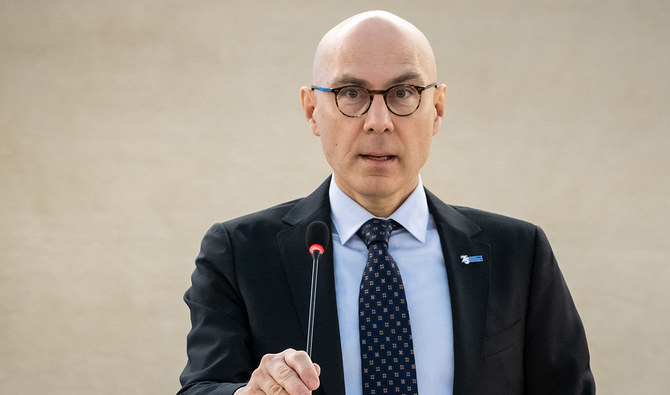GENEVA: The UN human rights chief on Friday denounced the “unfathomable” call by an Israeli minister for a flashpoint Palestinian town to be “wiped out,” urging an end to the violence.
Israeli Finance Minister Bezalel Smotrich made his comments on Wednesday, days after two settlers were shot dead in Huwara, killings, that led to Israeli settlers to attack the northern West Bank town.
“I think the village of Huwara needs to be wiped out,” Smotrich said. “I think the State of Israel should do it.”
Later, he tweeted that he “didn’t mean to erase the village of Huwara, but only to act in a targeted way against the terrorists.”
But UN rights chief Volker Turk, speaking before the United Nations Human Rights Council in Geneva, denounced Smotrich’s original comments as “an unfathomable statement of incitement to violence and hostility.”
Washington, a staunch ally of Israel, was even more blunt in its response to Smotrich’s comments.
“They were irresponsible, they were repugnant, they were disgusting,” US State Department spokesman Ned Price told reporters.
“Just as we condemn Palestinian incitement to violence, we condemn these provocative remarks that also amount to incitement to violence,” he added.
A French foreign ministry statement also condemned the comments as “unacceptable, irresponsible and unworthy coming from a member of the Israeli government.”
“These comments only fuel hatred and fuel the spiral of current violence,” the statement added, appealing for calm.
Smotrich, an extreme-right settler, spoke during a surge in violence in the Israeli-Palestinian conflict, and specifically in the West Bank, which Israel has occupied since the Six-Day War of 1967.
The attack on Huwara late Sunday saw hundreds of settlers set homes and cars ablaze and hurl stones, while a Palestinian man was killed in the nearby village of Zaatara.
More than 350 Palestinians were injured, most suffering from tear gas inhalation, the Palestinian Red Crescent Society said.
On Monday, gunmen shot dead an Israeli-American motorist, and on Wednesday, Israeli forces searching for suspects in the Aqabat Jabr refugee camp near Jericho killed a Palestinian man.
Presenting his office’s latest report on the situation in the occupied Palestinian territory, Turk warned the council Friday that the “increasing violence is condemning innocent people on all sides to further tragedy.”
He called on “decision-makers and people on all sides... to step back from the precipice to which increasing extremism and violence have led.”
Since the start of the year, the Israeli-Palestinian conflict has claimed the lives of 65 Palestinian adults and children, including militants and civilians.
Thirteen Israeli adults and children, including members of the security forces and civilians, and one Ukrainian civilian have been killed over the same period, according to an AFP tally based on official sources from both sides.
The upsurge in violence comes after last year saw the highest number of Palestinians killed by Israeli security forces in 17 years, and the highest number of Israelis killed since 2016, Turk pointed out.
“I condemn the violence that has killed and harmed so many people on both sides, and which generates overwhelming despair,” he said.
Many country representatives echoed Turk’s concerns Friday, while Palestinian ambassador Ibrahim Khraishi took the rights council floor to urge the international community to take “punitive steps” against Israel.
Israel, which routinely accuses the UN and especially the Human Rights Council of bias against it, meanwhile did not have a representative in the room for Turk’s presentation.
The UN rights chief called on both sides to adhere to a commitment to de-escalation reached following talks Sunday in Jordan.
“In the near future, there must be an end to settlements in occupied land. And within a foreseeable horizon, there must be a two-state solution,” Turk insisted.























